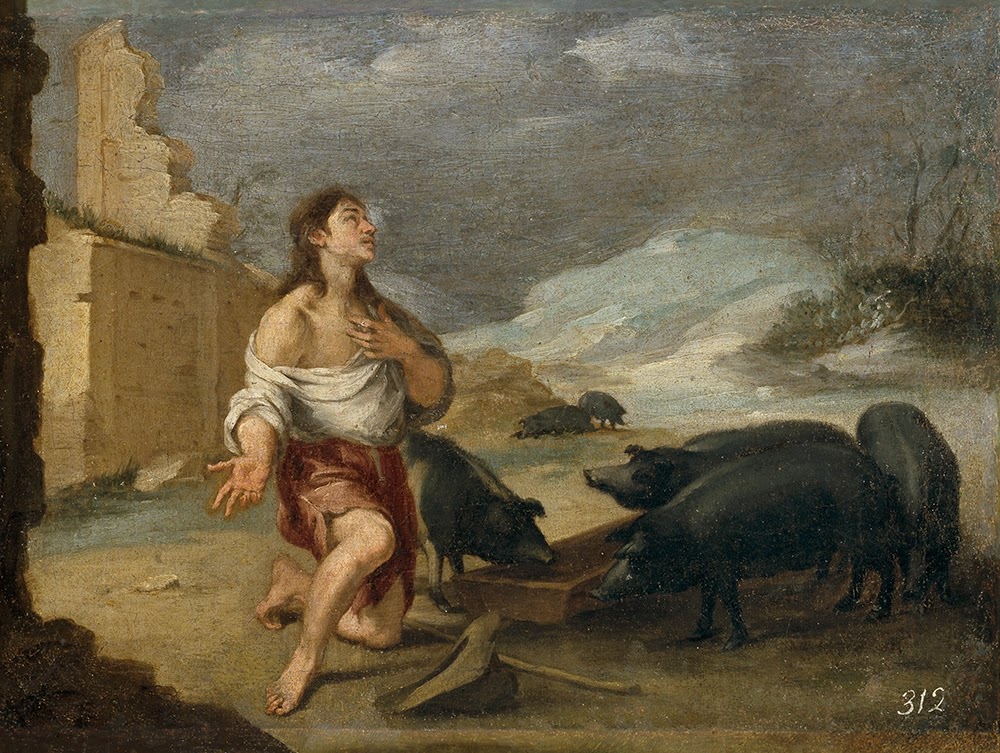13th Sunday of the Year (C)
The most recent installment of the Star Wars saga turns around Obi-Wan Kenobi’s startling realization that his padawan apprentice, Anakin Skywalker, who he thought he had left for dead, in fact, lives in the ruthless and fearsome Sith lord Darth Vader. Obi-Wan must now contend with the fact that his own student, whom he once loved as a brother, has utterly rejected his master’s teaching and has instead fully embraced the dark side of the Force to advance his reign of terror in the galaxy.
If we can take the premise of Obi-Wan as an analogy of the Christian life, we would find that the startling realization on which our lives turn goes in the opposite direction. We are not one and the same as Anakin Skywalker, although we do share with him a divided heart. As we recognize our own failure to adhere to the teaches of Christ our Master in preference of our pride, we look at ourselves in the mirror and ask, “What have I become?” Our sin and its destructive force with which it wreaks havoc on our lives and on those around us causes us to shriek before the thought of the teaching we have rejected and to be humbled before the throne of grace to beseech the Lord his mercy. Whatever strides we may have made to follow the path of light, we nevertheless feel pulled toward the opposing path of darkness. According to Paul, the Spirit and the flesh, the light and the dark, contend with one another, and the battleground on which their contention is fought is the very depth of our existence: “For the flesh has desires against the Spirit, and the Spirit against the flesh; these are opposed to each other, so that you may not do what you want.”
What is even more startling than the profundity of this conflict within us and our repeated failure to do the good that we want to do is the fact, confirmed by our faith, that through it all we have not ceased to be apprentices of Christ, our Lord and Master. He has not abandoned us, crippled as we are to the point of death by our pride, but yet still stretches out his hand to set us free and make us whole. We remain, despite our infidelity, in the school of discipleship into which he has initiated us as members of the Church through baptism.
On that day, when water was poured over our head, we were covered with the mantle of the Father and given the Spirit of adoption to be his son or daughter with all the rights and honors that come with it. As the prophet Elijah covered Elisha, his successor in the prophetic ministry, with his mantle and thus took him as his own son, the same and inestimably more has happened by grace to each one of us. Elisha asked his master for a double portion of his spirit, the inheritance rightfully his as his son, and that did he receive; and that did the Father also bestow upon us, in pouring forth his own Holy Spirit that by the same Spirit we may be set free from the yoke of slavery and live.
To live free from the yoke of slavery means that our heart must be healed of its division, and love and choose only that which the Spirit proposes to our freedom. As sin was the cause of its division, only grace can be the cause of it becoming whole. Grace is received through faith, and faith comes from what is heard; and thus, we must look to the Scriptures to hear how the grace of God seeks to reach us today, to heal us, free us, and enable us to live.
Luke’s Gospel presents us with several vignettes that evidence different responses to Christ’s invitation to discipleship. These after Jesus has “resolutely determined to journey to Jerusalem,” when he has turned to face his passion and death which are imminent; and each typify a response that we can also have to Christ’s call when the fear of its demands overwhelms us. So also does each reveal to us a particular gift of the Spirit that the Father apportions to us through his Son to enable us to make the free and generous response he desires to his call.
First, there is the zealous response of James and John who want to call down fire from heaven to consume the Samaritan village that did not welcome him. Concerned that Jesus is walking into his own death, the two disciples failed to grasp the meaning of their Master’s earlier teaching that the“Son of man is to be delivered into the hands of men” (9:44). Afraid also that his death would mean theirs as well, they have failed to let their Master’s words “sink into [their] ears” that “whoever loses his life for my sake, he will save it” (9:24). Thus, do they turn from their Master’s instruction and seek power and destruction to secure for themselves peace and security. Fear of imminent suffering for the sake of Christ likewise tempts us toward using whatever power we may (or, in fact, may not) have at our disposal to evade what is coming our way. But when we do, we only grasp at air. For to avoid suffering is to avoid the cross, and to avoid the cross is to avoid also the grace of resurrection by which we are reborn to new life. Thus, we need the Spirit’s gift of fortitude to face and not run from whatever hardship awaits us in our mission ahead.
Second, there is the naïve and idealistic response, “I will follow you wherever you go.” Here the temptation is to throw ourselves headfirst in following Jesus without taking seriously the sacrifices that are required of anyone who wishes to be his disciple. Again, fear may entice us to gloss over hard and difficult parts of Christ’s teaching, such as “the Son of Man has nowhere to rest his head” and explain them away or conclude that they don’t also apply to us. Naiveté and idealism, however, only make the harsh fall back down to reality all the heavier; and when the fall has come, we fill find ourselves not following Christ wherever he goes, but once again under the yoke of sin, chasing the enticements of the flesh instead of the movements of the Spirit of Christ. Rather than not take the demands of the Gospel seriously, we need the grace of solicitude or shrewdness to be aware of what we must do and thus find the courage to do it.
Third and finally, there are those two would-be disciples who seek to delay the acceptance of their call by first attending to the needs of their family. Jesus’ responses to both their objections are no doubt hard to stomach; and, without stripping them of their meaning, they nevertheless must be appropriated relatively to each of us according to our vocation and state in life. What is, however, applicable to us all, is this: when Christ says, “Let the dead bury their dead,” and, “No one who sets a hand to the plow and looks to what was left behind is fit for the Kingdom of God,” he means that he will not suffer any kind of half-heartedness in his apprentices. He will not tolerate anyone who keeps one eye fixed upon the past or upon what was left behind, lest the sacrifices demanded by the present lure us to flee to whatever our heart has held in remainder. It is the Spirit’s gift of piety that propels our heart to find its rest entirely in God alone, who is always “God with us” in the present moment, that we should not be tempted by the deceitful allure of the past but fulfilled by the God who is with us now.
As we grow in the knowledge of what we have become, we may recognize these tendencies within us to shy away from the full embrace of the Gospel to which Christ calls us in fear of its demands. We may grasp for power and control, hold to an unrealistic ideal, or look back toward what once was. And as we earnestly strive to correct those tendencies, we will at times conquer them and other times fall again to be their victim. Yet in the Christian life, that is par for the course, for the Spirit and flesh, light and darkness, will continue their struggle within us until, at last, we are brought, please God, into that city that “has no need of sun or moon to shine upon it, for the glory of God is its light, and its lamp is the Lamb” (Rev. 21:23). In that place alone will the light definitively vanquish the darkness. In the light of glory, we will not be appalled by what we once were but overwhelmed in joy by all that we have become, utterly transformed by his grace to be true and whole sons and daughters of our heavenly Father.
Until then, however, we are pilgrims on the way, apprentices of Our Lord and Master, who teaches us how to live and pours his Spirit to change us, bit by bit, into the people he has destined us to be. Let us heed his teaching and his grace.

-1.jpg)


Comments
Post a Comment